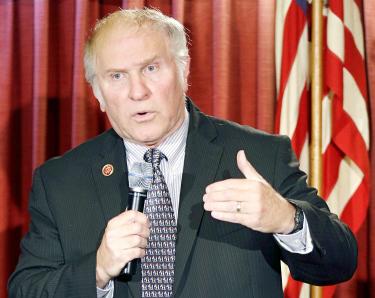Members of the US House of Representatives on Thursday introduced a draft Taiwan travel act that seeks to lift restrictions and allow all high-level officials of Taiwan, including the president, to visit Washington.
The bill, introduced by US representatives Steve Chabot, Brad Sherman and Ted Poe, states that “it should be the policy of the United States to encourage visits between the United States and Taiwan at all levels.”
“Over the past decades, United States-Taiwan relations have suffered from a lack of communication due to the self-imposed restrictions that the United States maintains on high-level visits with Taiwan,” the text of the bill says.
The proposal advocates a policy of allowing all high-level Taiwanese officials to enter Washington or US embassies and consulates under conditions that demonstrate respect for such leaders.
The US should also allow high-level Taiwanese and US officials to meet in executive departments in the US, including the US Department of State and the US Department of Defense, according to the bill.
It should also allow Taiwan’s representative offices to conduct official business activities, including those involving US lawmakers and government representatives without obstruction from the US government or any foreign power, according to the bill.
In a statement, Peter Chen (陳正義), president of the Washington-based Formosan Association for Public Affairs, called the introduction and timing of the act “significant.”
“With the new administration in place in Taiwan, the time is now for the US to enable Taiwan’s president [among others] to come to Washington without restrictions,” said Chen, whose organization is active in promoting Taiwanese independence.
“Why do we let the unelected leaders of China come to D.C. and give them the red carpet treatment at the White House with a 21-gun salute, while we shun the democratically elected leaders of long-time ally Taiwan?” he asked.
Beijing considers Taiwan to be part of its territory and opposes any behavior that could suggest Taiwan is a sovereign nation, including visits by senior officials to nations with which Taiwan does not have formal diplomatic relations.
Presidents of Taiwan have made unofficial “transit” stops in the US on their way to allied nations in Central and South America, but even those have steered clear of Washington.
The most recent visit by a senior Taiwanese official to Washington was by then-minister of economic affairs John Deng (鄧振中) in February last year, the first such trip by an official in his position in 11 years. Trips by other Cabinet-level ministers are also extremely rare.
The bill has to be passed by both the US Senate and the US House of Representatives, and signed by the US president before it becomes law. The president can veto the bill.
In response to the bill, the Ministry of Foreign Affairs in Taipei said it was grateful and welcomed the bill proposed by the representatives, adding that the two nations have close ties and good communications and will continue to deepen their relations.
Source: Taipei Times - 2016/09/17





















